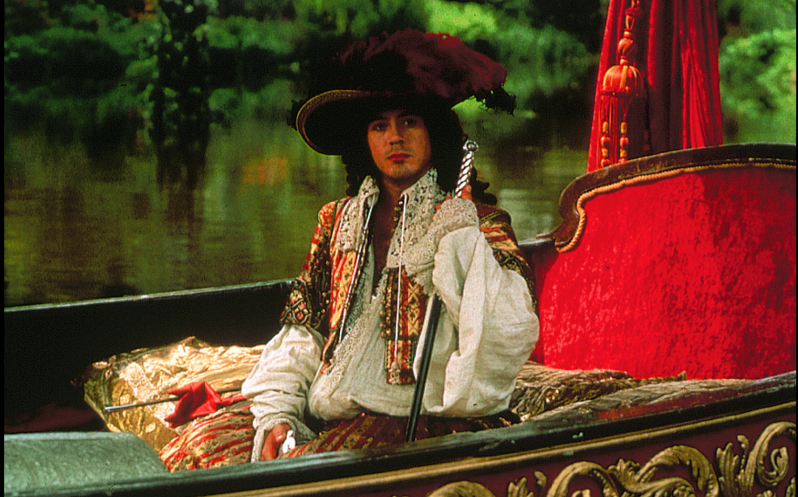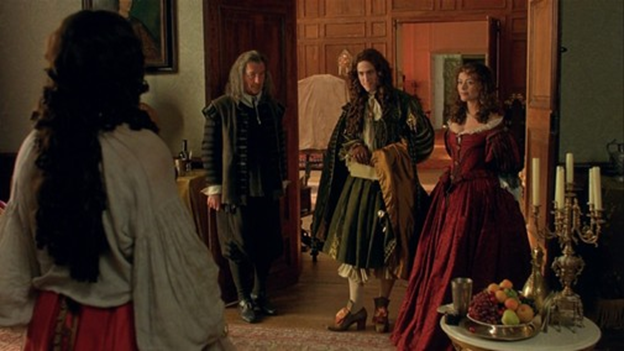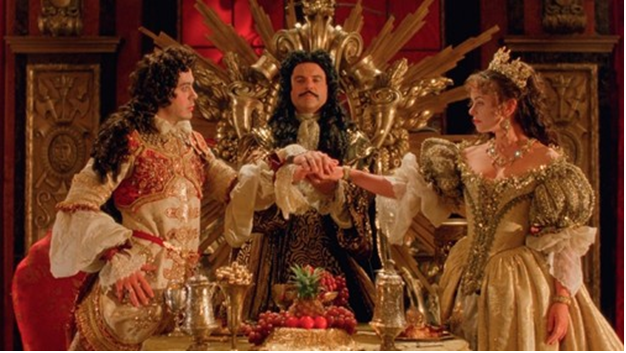The film, Restoration was created by American movie production and distribution company, Miramax, and directed by Michael Hoffman. In adapting Rose Tremain’s 1989 novel, director Hoffman and writer Rupert Walter managed to capture the decadence of the time with remarkable accuracy, but that was not enough to prevent Restoration from seeming like an increasingly ponderous and antiquated costume melodrama. Cary Brokaw, Andy Paterson, Sarah Ryan Black, and Kip Hagopian were the executive producers. Rupert Walters wrote the screenplay, adapted from Rose Tremain’s book. The movie runs for one hour and 58 minutes. The filmmakers’ choice of a hero who is astonishingly docile for the genre does not help the situation. The movie stars David Thewlis as John Pearce, Merivel’s companion, Polly Walker as Celia Clemence, Sam Neil as the King, Robert Downey Jr. as the doctor Merivel, and Sam Neil as the King.
The title Restoration comes from the era of the same name. The English physician Robert Merivel serves as the book’s narrator and protagonist. Merivel is conceited and preoccupied with having a considerable fortune, frequently daydreaming about the luxury he hopes to acquire in the future. Young Robert Merivel, a physician in 1663 London, is so discouraged by the rudimentary state of medicine that he spends his nights in debauchery. The wretched animal, tortured by the primitive medical procedures of the time, is beyond cure but suddenly recovers, seemingly securing Merivel’s fortunes. As a reward for marrying one of the king’s favored but most contentious mistresses, Merivel is endorsed for knighthood and awarded one of England’s stateliest houses by King Charles II. The issue is that the doctor cannot fall head over heels for his lovely bride.
Period Setting
In Restoration, by Michael Hoffman, the film depicts the court of Charles II, who replaced the austere Cromwell era with a chaotic period of sensuous excess. The movie has many good qualities, but the one that appeals is how passionately it portrays a daring and vibrant historical period. Robert Downey Jr. takes the readers through the 17th century in Restoration, in full royal regalia. Robert Merivel, a charming young man who travels on a spiritual odyssey from the lavish court of Charles II to the plague-ridden alleys of London, plays the title character in this engrossing historical saga. The movie is set just before the Great Fire of London, which occurs the following year and coincides with the historic outbreak of the bubonic plague in 1665. Volume was a defining feature of men’s and women’s clothing in the 1730s. The costumes in the movie match the historical outfits depicted by Merivel in Figure 1 below. The women’s clothing also showed that the society was changing how it perceives women during.

The social setting of the film is deeply rooted in 17th-century societal norms. The movie is a ribald twist on the Hollywood costume genre, which is delightfully cynical. Doctor Robert Merivel is a good-hearted innocent caught up in the frenzied pomp and sexual intrigues. The societal context of the movie displays the apparent power structures and how people could abuse them to escape punishment. In the film, which follows a socially ascending doctor in Charles II’s England, Robert Downey Jr. portrays the lead character as he undergoes a significant change in appearance. When he first appears, he appears to be living under Cromwell’s dominion, dressed in demagoguery.
Detailed Costume Analysis
The excellent portrayal of 17th-century England adaptation in the movie was a success. The film is incredibly gorgeous to watch and has some of the best Baroque designs in movie history, despite some overwhelming feats of miscasting and a disorganized plot upended by the arrival of the Black Plague. The setting embraces the theatricality of Charles II’s court, resulting in an ominous, gold-gilded universe. In turn, the clothes delight in the oddities of 1660s fashion, creating a world of stark contrasts between royal luxury and the strict austerity of Puritan charity.
Like many other pieces of clothing, undergarments varied according to the social class of a woman or a man wearing them in the movie. Women ready to marry donned more seductive attire to entice suitors with their external beauty. For instance, the king’s introduction of Celia to Meriden was highly skillful. On the other hand, the males donned bulky attire to convey prestige and elegance, which was enough to command respect at the time. The monarch’s attire is frequently golden and changes depending on the occasion. The plague doctors also wore distinctive apparel designed for their jobs and distinguished them from other medical professionals. Hugh Grant wearing all-green clothing from head to toe was another example of clothing that was visible in the movie, as were Merivens’s episodes of Orientalism. On the other end of the scale, Meg Ryan’s worn-out men’s jacket and the fact that the main character struggles to leave with a fur-trimmed frock coat even as his outlook on life improves shows brutal pragmatism.
After all, 17th-century England was a chilly place, and rich materials were not simply for lavish display. Only royalty and others of the upper class could afford gold, silver, or embroidered ornaments that cost much more. The marriage of Meriven and Cleo is a prime example of this. The standing woman’s unpowered hair and flowing back pleats, a hallmark of the Restoration royalty, still today’s most popular and in-vogue large-scale floral and foliate silk motifs, are depicted in Figure 2. Both men and women had long hair, which had a view as attractive. Makeup decoration by young women happens only at celebration times for other women but usually for high-class women in that era.

Historical Accuracy
From the most regal monarch to the poorest peasant, every character displays matching costumes, yet the hero may experience the most visible arc in costume design. The main actors’ extravagant wardrobes are also worn by the extras, providing the audience with an immersive experience. Additionally, there is an abundance of clever, minute details span from humorous to realistic. As shown in Figure 3, Merivel discusses his plans about how to characterize his wedding. It was like a passably excellent play, when certain lines, specific scenes, combinations of people, costumes, and light remain fresh in the mind long after the performance has ended. Men’s and women’s clothes became extravagant throughout the 17th century. The popularity of ribbons in menswear peaked, and silk brocades returned to being in vogue for womenswear. By the decade’s end, a new long coat design without a collar had replaced the doublet. The costumes used by the characters and the movie’s backdrop effectively portray the depiction.

Relationship to Contemporary Fashion
Since they demonstrated elegance and authority, details in dressing and outfitting laid heavily on the garments. The wealthy upper class wore elaborate clothing because it was expensive to purchase. Large gowns, big hair, ruffled collars, chunky jewelry, and corsets to slim women’s waists were a few of the essential accessories. Men also wore working shoes, beautiful caps, and collars with ruffles, where class differentiated high-end fashion and mainstream fashion. Most of the things in the exhibit of the movie had the creation for middle- to upper-class consumers. The 17th century was a fascinating time for fashion because it was starting to change more quickly than ever before as the world opened up due to the establishment of new trade routes, the travels of explorers, and the migration of many people to new continents, including the European settlers in America. The relation was there was unintentional because of such influence on them. It led to adapting dressing in the modern fashion world, such as the capes, the ruffs, and the Van Dyke beard.
Bibliography
Alves, Claudio. “Restoration @ 25: Honoring the Great James Acheson – Blog – the Film Experience.”thefilmexperience.net, 2020. Web.
Coss, Peter R. The Lady in Medieval England, 1000-1500. Stackpole Books, 2000, pp.120-127.
Hayward, Maria. Dressing Charles II : The King’s Clothing Choices (1660–85).”Apparence(S), no. 6 (2015): 23-89. Web.
Kettle, Ann J., Contributor Barbara A. Hanawalt, Contributor Carol J. Clover, Contributor James A. Brundage, and Contributor Laurinda S. Dixon. Matrons and marginal women in medieval society. Boydell & Brewer, (1995): 45-99.
Schofield, Phillipp. Peasant and community in medieval England, 1200-1500. Springer, 2002.
Ward, Jennifer. Women in medieval Europe 1200–1500. Routledge, (2016): 23-121.